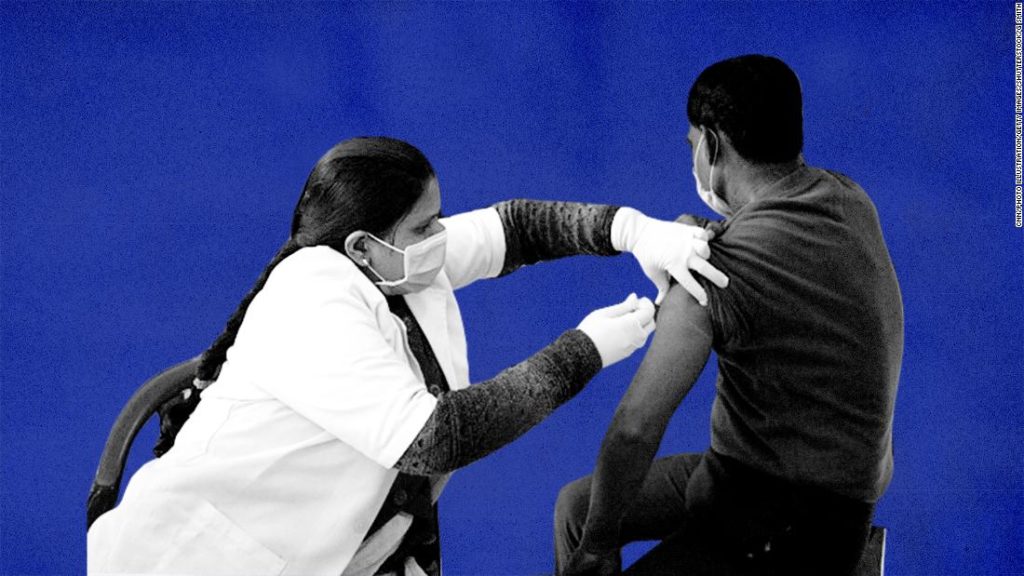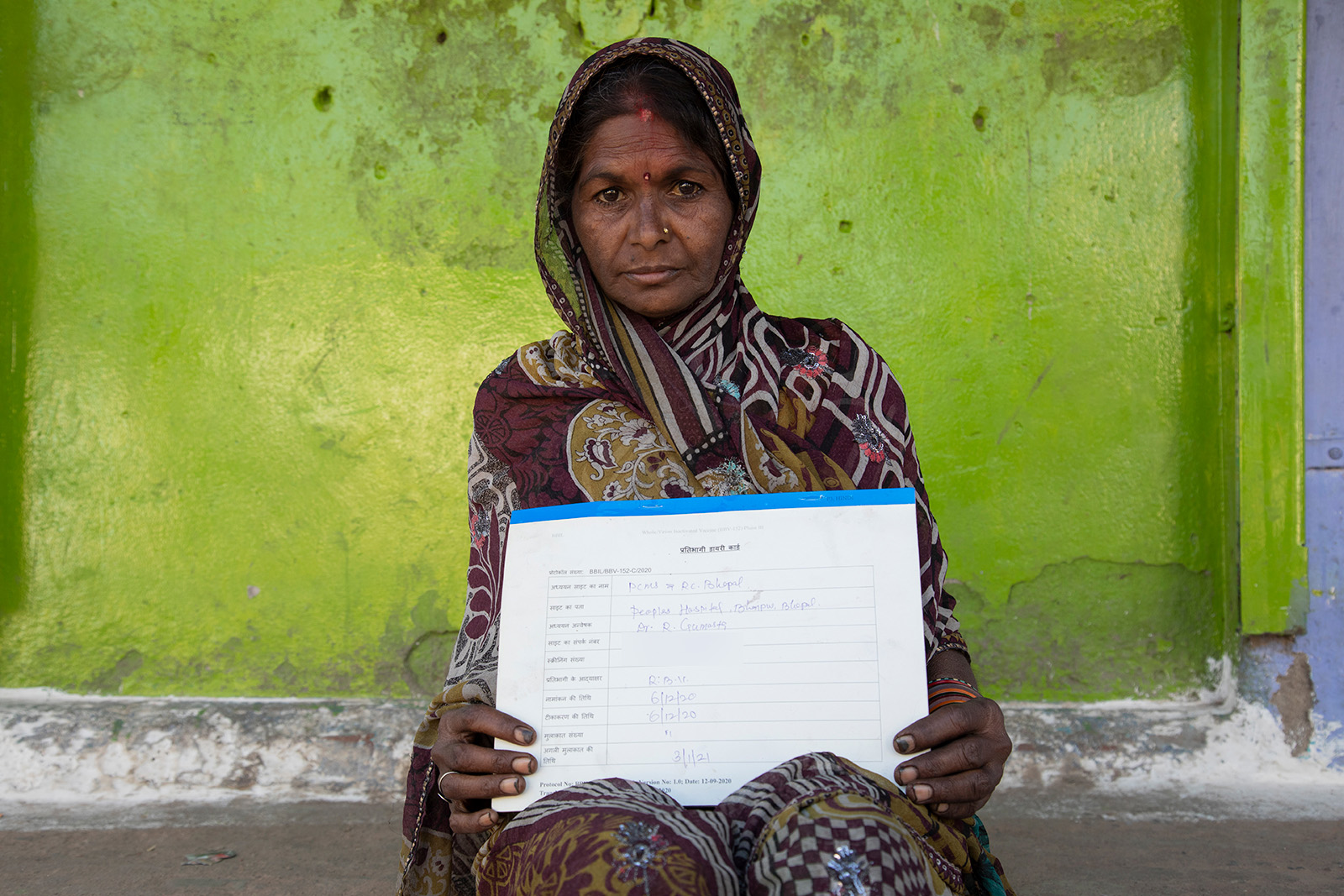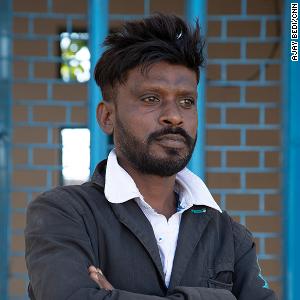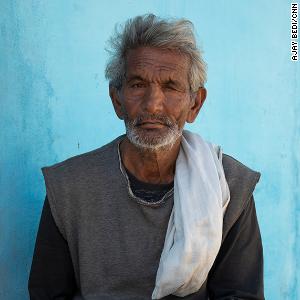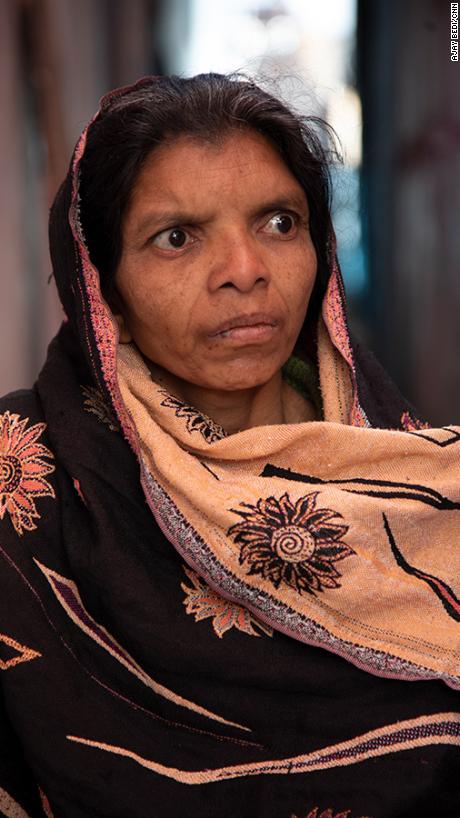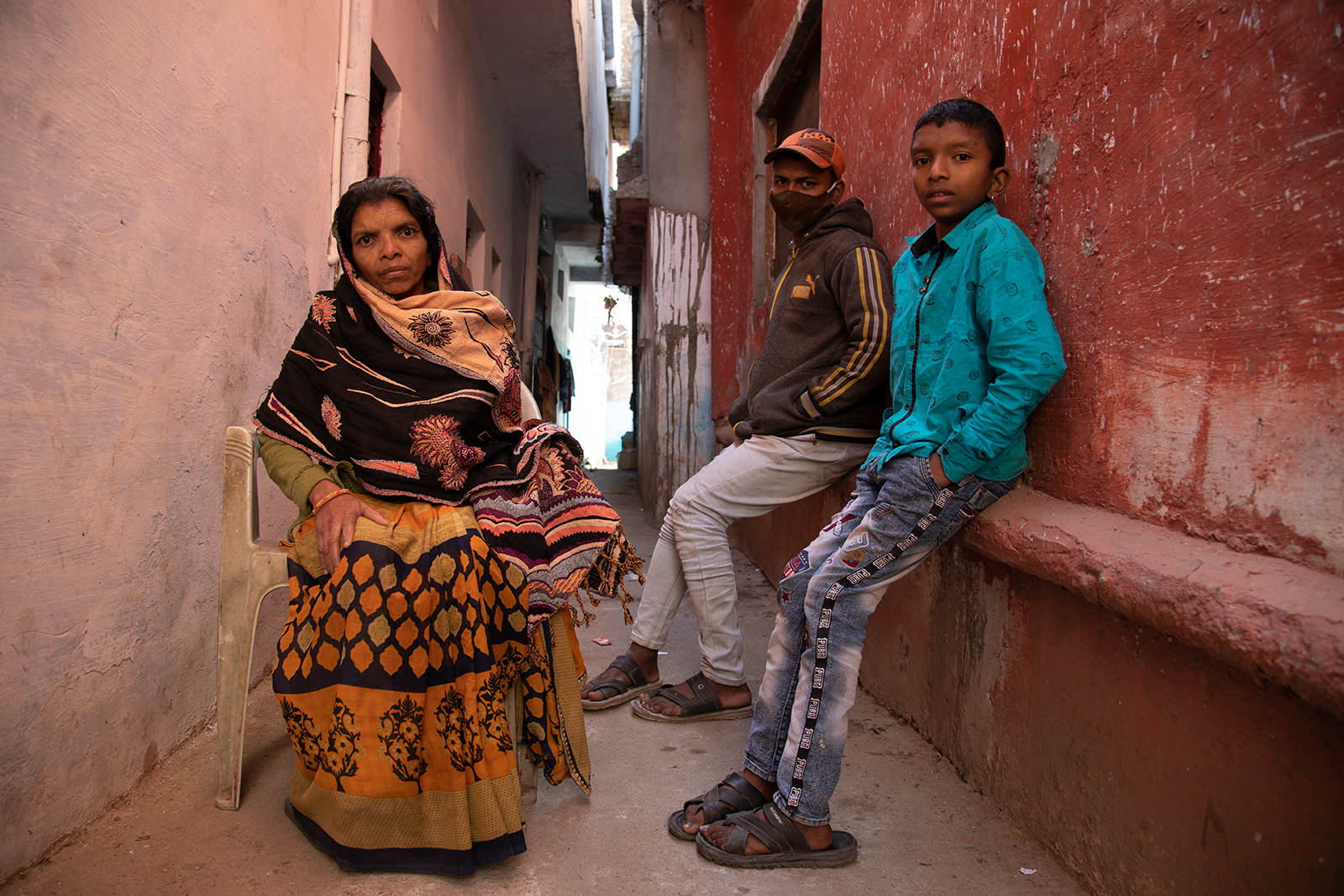Locals who recalled hearing it back in December said they scrambled to take up the offer — 750 rupees was about twice what they’d usually earn for a day’s hard labor. And many had struggled to work at all during the pandemic.
“They told us it is the corona vaccine and we should get it so that we don’t fall sick,” said Yashoda Bai Yadav, a housewife from Bhopal who participated in the trial alongside her husband.
The Shankar Nagar slum — where many of the participants live — is just 3.7km (2.3 miles) from the abandoned Union Carbide factory which was at the center of the 1984 disaster that exposed more than half a million people to a toxic gas cloud. Nearly 4,000 people died in the immediate aftermath, and the disaster was blamed for at least 10,000 subsequent deaths, and more than 100,000 permanent injuries.
Decades later, many residents still suffer related health issues, raising questions from local non-governmental organizations about residents’ suitability to take part in a study that vaccine developer Bharat Biotech has called the biggest Phase 3 vaccine trial ever conducted in India.
Phase 3 trials are traditionally the final step of human trials before a vaccine is authorized to roll out en masse. However, Covaxin was approved by the Drugs Controller General of India for restricted emergency use in January, before preliminary results from the trial were released. Its Phase 3 trial isn’t expected to be completed until next year. The government has procured 5.5 million doses of Covaxin and 11 million doses of Covishield — the local name for the Oxford-AstraZeneca vaccine — for the first phase of what it is calling the largest immunization drive in the world.
At least two bioethics experts, one public health expert and four local non-governmental organizations, have raised ethical questions about the trial site in Bhopal, run by People’s Hospital, which is associated with the People’s College of Medical Sciences and Research Centre. In addition, those concerns were also raised in a joint statement released on January 14 by more than 40 organizations and 180 individuals, including public health activists and bioethicists.
More than a dozen Bhopal trial participants told CNN they did not know they were taking part in a clinical trial. Another four knew they were part of a trial, but say they did not understand what that meant.
Bharat Biotech, ICMR and People’s Hospital have all denied wrongdoing. They say that the trial complied with study protocol, guidelines and regulatory provisions, and that they are focused on generating high quality data and would not do anything that compromises patient safety. They say that participants gave informed consent and denied that the money offered acted as an incentive. India’s drug regulator, the country’s health ministry, and the ethical committee overseeing the trial in Bhopal have not commented on the allegations.
But Jesani, Dr. Anant Bhan, a Bhopal-based bioethics expert, and Amulya Nidhi, a public health expert and the co-convener of the People’s Health Movement India, all say that the alleged recruitment process, if proven true, would be a violation of Indian protocols governing how vaccine trials should be conducted.
That could undermine the quality of the trial data, and potentially global trust in India’s prized coronavirus vaccine.
‘We thought it was the vaccine’
Shankar Nagar slum in Bhopal is made up of tiny, colorful houses with roofs created from tin sheets and discarded tarps.
Typically, many locals work as day laborers, waving down vans on the main road each morning to go to construction sites where they spend hours lifting stones and bricks. Since the pandemic, there hasn’t been enough work to go around, forcing many to rely on government-provided rations. Some women wander the slum, carrying sticks to sell as firewood. Others have turned to alcohol or chewing tobacco to pass the time.
So when the white van that locals recalled arrived in Bhopal slum areas near People’s Hospital offering the vaccine, 18 people saw it as a quick way to make money, they told CNN.
“My life will go anyway someday,” Hira Bai, a mother of three, said sardonically. “I went because of the greed of 750 rupees, anyway we are used to dying … my life has no value.”
Locals say they believed the van was from People’s Hospital, a private institute less than 3 kilometers (1.9 miles) away from Shankar Nagar which would often send vans to the area to conduct checkups as part of the hospital’s community outreach program. Some said they immediately piled into the vehicle, which seated more than a dozen passengers.
“The van came and everyone around me was going so I also went,” said Kesri Chillaar, 59, a laborer who lives with his wife and three children in nearby Gareeb Nagar slum.
“We thought it was the vaccine, so we went,” said Yadav, the housewife, who lives in Oriya Basti, another slum close to Shankar Nagar. “We didn’t know it was a trial.”
Chotu Das Beragi, a 27-year-old laborer, said he heard the loudspeaker announce that if he didn’t take the vaccine now, he may have to pay money for it later. “I thought, ‘There is no work anyway these days’ … so I thought, ‘Let me get the vaccine, I will get 750 rupees as well,'” he said. “I thought, ‘This will be a good way to get the day’s earnings.'”
Once at the hospital, a large white building with columns and reflective blue windows, 12 participants told CNN they were asked to sign forms, although two people only signed the forms when they received their second shot. Another one gave audio-visual consent and another was asked for a thumb print instead of a signature. However, of those 14 participants, eight said that they were unable to read — the state of Madhya Pradesh, where Bhopal is located, has one of the lowest literacy rates in India at around 70%, according to the country’s most recent Census in 2011. Only participants over 60 said they were offered audio-visual consent forms. The four who could read said they weren’t given the opportunity or time to go through the 10-page form written in Hindi. The form, which CNN has obtained, includes jargon such as “immuno response,” “placebo” and “immunogenicity” — terms that would be confusing to anyone without medical training.
Although six people CNN spoke to said they were aware they were in a trial, four said they did not understand what a trial involved, or concepts such as a placebo. “I did not understand what it was a trial of,” said Beragi, the day laborer. Only two of the 21 participants CNN spoke to knew they were in a trial and had full understanding of what that entailed.
All 21 of the participants CNN spoke to said they were given forms to record any adverse effects of the shot. However, none had written anything on it, despite eight of the 21 participants describing side effects, including aches, vomiting, stomach issues, pains, and feeling weak. It is unclear whether the people who described side effects received the vaccine or the placebo. They said they didn’t know why recording their symptoms was important. At least 13 of the 21 participants told CNN they were illiterate, meaning they were unable to use the form anyway.
Anil Kumar Dixit, the dean of People’s College of Medical Sciences and Research Centre in Bhopal, said he was not aware of any van and did not send one to the slums. He said it was clarified to participants that they were part of a trial, and that only 50% would receive the vaccine while the other half would be given a placebo. He said the hospital did pay participants 750 rupees, per the ICMR and Bharat Biotech’s instructions, but it was to cover them for any lost wages — not as an incentive to take part in the trial.
Under ICMR’s 2017 Ethical Guidelines, subjects may be paid for their inconvenience and reimbursed for expenses incurred, although not to such an extent that it induces them to take part.
Dixit said his hospital did not ask participants if they were Bhopal gas victims, although administrators did examine them for underlying health conditions and rejected them if they had a chronic health problem. Bhan, the Bhopal-based bioethics expert, said he was surprised the hospital hadn’t considered that some participants might be victims of the Bhopal gas tragedy.
Around 10% of all Bhopal participants reported minor adverse effects, while around 1 to 2% were treated in hospital, according to Dixit. He said his hospital was only registering adverse events that required treatment, and that most of the minor events had been resolved over the phone.
Dixit said that for those who couldn’t read, the form was explained in either Hindi or English, depending on what they preferred, before they signed.
Staff from People’s Hospital which is administering the trial told participants they would check up on them via phone, according to Dixit and the participants, but two participants CNN spoke to said they hadn’t received a call, and two said they didn’t know if they had. Another participant said they had received calls in the first week, but not in the second week when their adverse effects started.
Two others said they had received calls but that their phone belonged to a family member, making communication harder.
Four people CNN spoke to said they needed to go to a hospital for treatment, and of those two said they were asked to pay for treatment for what they considered adverse effects, including neck pains and vomiting, despite the 10-page document that they signed stating that they would be covered, something that is also required by India’s Good Clinical Practice guidelines.
Chillaar, for instance, said that when hospital administrators called to check on him following the shot, he told them that he was having neck problems. They told him to come in for treatment, but when he did, he said he was told to pay more than 3,000 rupees ($41). Dixit, dean of People’s College of Medical Sciences and Research Centre, said there were only “one or two cases” where miscommunication led to participants being charged.
Chillaar says he got the first shot on December 10 and the second on January 7 — Covaxin requires two shots administered four weeks apart. When he spoke to CNN on January 28, he said that he was still not able to work. “I am the primary earner and it has come to the point where we are going hungry,” he said. “I am not even able to go earn and I have spent 3,000 to 4,000 rupees on treatment.” CNN has no evidence that the shot caused his health issues and it is unclear whether he received the placebo or vaccine as the trial is blinded.
What the rules say
Hundreds of people who live in the Shankar Nagar slum still live with health effects from the Bhopal gas tragedy, according to Rachna Dhingra, the leader of Bhopal Group for Information and Action (BGIA), which works with communities impacted by groundwater contamination from the leak.
In late December, Dhingra says she began hearing reports of people living in the slum being given the coronavirus vaccine. That set off alarm bells: she knew India hadn’t yet formally rolled out a coronavirus vaccine.
Dhingra began investigating and found that many of those people had actually been part of a clinical vaccine trial — and many said they did not realize it.
Dhingra and BGIA spoke to 233 participants, and estimate that 800 residents from more than five slum communities impacted by the 1984 tragedy in Bhopal had been part of the Phase 3 clinical trial. Nasreen, a field worker from BGIA who uses only one name, said that in many cases entire households of five or six people had taken part in the trial.
Dhingra says in all of the cases there were issues around how consent had been obtained.
“It spread like wildfire because people thought they were not only getting vaccinated, but also that they were getting money,” Dhingra said. “They could never do this kind of announcement in middle-class neighborhoods because everyone would know that this is not possible.”
India’s New Drugs and Clinical Trials Rules 2019 require “freely given, informed, written consent” from each study subject, including that they understand the risks and responsibilities involved in receiving an unapproved drug. Information must be provided verbally and in a patient information sheet in “language that is nontechnical and understandable by the study subject.”
In the case of Covaxin, the vaccine had only been tested on approximately 755 people across both Phase 1 and 2 trials before it was administered in Phase 3 clinical trials — and those Phase 1 results, which were released in the Lancet in January, were not out when many of the participants received their first dose. That study found that the vaccine can produce antibodies to coronavirus and no serious adverse events related to the vaccine were reported.
ICMR’s head scientist of the division of epidemiology and communicable diseases, Dr. Samiran Panda, said the seriousness of the pandemic justified using the accelerated approval process without cutting any corners when it came to safety.
Dhingra also says around 25% of the participants the NGO spoke to reported experiencing adverse effects — more than twice the number that Dixit said had suffered minor adverse effects. In trials across the world, it is common for participants to report some adverse effects during a trial.
One Bhopal trial participant who died nine days after receiving the injection has drawn widespread media attention in India, prompting outlets to publish stories raising questions over the trial.
CNN has no evidence that 45-year-old Deepak Marawi’s death was linked to the vaccine trial, but because of the lack of transparency around his death — the post-mortem still hasn’t been made public — his widow, Vaijayanti Marawi, and others following the trial say the case raises concern and requires further examination. Bharat Biotech could not confirm if Marawi received the vaccine or placebo as the study is blinded, but they said his death “had been thoroughly investigated” and found not to be connected to the trial. The company says Marawi died from cardiorespiratory failure as a result of suspected poisoning.
Dixit said staff had followed up with Marawi for seven days, as he said they do with all participants, to ask about any problems. Marawi had said no every day, Dixit said.
Arun Shrivastav, the head of the pharmacology department at the Gandhi Medical College in Bhopal, which headed the investigation into Marawi’s death, said that his committee’s investigation found that the trial protocols had been adequately followed. When asked generally about the alleged use of vans in recruitment, he said that if a van loudspeaker was used to advertise the vaccine for 750 rupees, then it would be “unethical, totally wrong.”
“If there is anything like this happening then it cannot be counted in the trial and the trial would be barred,” he said.
‘Violation of good clinical practices’
Bioethics and public health experts Bhan, Jesani and Nidhi all said Bhopal residents should have been considered vulnerable, and extra care should have been taken to ensure they knew what they were agreeing to.
The standard for getting consent is even higher for vulnerable communities — including people who are impoverished or illiterate. According to India’s 2019 New Drugs and Clinical Trials rules, if a trial participant is unable to read or write, an impartial witness should be present throughout the entire informed consent process to help sign the consent form. An audio-video recording of the informed consent process is required in cases using “vulnerable subjects,” which includes “impoverished persons” and patients with incurable diseases.
“You are dealing with people who are highly vulnerable, who are not even fully educated, do you expect them to come and say, ‘These are my rights’?” said Jesani, the editor of the Indian Journal of Medical Ethics. “You have to inform them about their rights.”
As for the offer of 750 rupees, Bhan, the Bhopal-based bioethics expert, said it was not necessarily an ethical violation for money to be offered — the issue is whether it was used as an incentive.
But statements made by participants suggest that even though the amount offered was relatively low, it was enough to motivate some trial participants in Bhopal. Madhya Pradesh, where Bhopal is located, has some of the lowest wages for casual workers in India, according to a 2018 India Wage Report by the International Labour Organization. “I thought it was some patriotic thing and, I won’t lie, we were getting money also,” said Bhopal resident Panti.
If the allegations about misleading participants, failing to get informed consent and failing to follow up on adverse events are true, the problem goes beyond ethics — it reflects on the quality of the trial data, according to experts.
Bhan said that if adverse events were missed, that meant crucial data points had been left out of the Phase 3 trials.
“If that is what has happened, it’s obviously a violation of good clinical practices. It’s also a violation of guidelines around how ethical conduct of research should happen,” he said, speaking about the allegations.
The current guidelines for clinical tests in India are relatively new. After Delhi liberalized its clinical trial policy in 2005, international companies rushed to test their drugs in India, where it was cheaper and easier to find participants. Some of the tests were reportedly carried out in Bhopal, on residents who allegedly weren’t aware they were involved in trials. The 2019 New Drugs and Clinical Trials Rules are a result of various orders from the Supreme Court following a case filed in 2012 by non-profit Swasthya Adhikar Manch, which Nidhi is also a co-convener of.
Bhan, Jesani and Nidhi believe the new Bhopal allegations, if true, suggest that more work needs to be done to improve oversight over clinical trials.
Jesani says, if the allegations are founded, it means the data from Bhopal should be excluded as the trial on that site wouldn’t have been done in a scientific way.
What can be done
On January 10, Dhingra and three other Bhopal-based NGOs wrote a letter to Indian Prime Minister Narendra Modi and Health Minister Harsh Vardhan, asking them to stop the Bhopal trial. They wrote that the involvement of the Indian Council of Medical Research in a trial with “glaring and grave violations” of the guidelines ICMR laid down was “alarming and deeply troubling” and said the situation must be addressed to avoid the public losing faith in vaccines.
They copied the letter to the Drugs Controller General of India, which has the power to investigate alleged breaches.
More than a month later, the groups say they have received no response.
Despite multiple requests for comment, Bharat Biotech has not responded to CNN’s emailed questions. In a public statement in January, the company said participation was voluntary and every participant gave fully informed consent, even those who were not able to read or write. All participants were paid 750 rupees, but it was not an inducement, the company said, rather a payment to cover transport and expenses, adding that they are following practices set by the Indian Good Clinical Practice guidelines. Participants are only enrolled after a careful assessment of their “various health parameters,” the company said.
“The development of Covaxin is a matter of great pride to us, not just at Bharat Biotech but also for India, and indeed the rest of the world,” the company said. “We would not do anything that would compromise either the scientific rigor of what we do or the lives of patients.”
“Our constant focus during the development of the vaccine and the clinical trials has been on ensuring patient safety and ensuring that the study is done to the requirements of all the relevant and applicable rules and guidelines, and that the data generated is of the highest quality and valid.”
Three other trial sites told CNN they had collected data on all minor adverse events, including headaches or fever.
Four trial sites told CNN they had difficulty reaching the target of 1,000 trial participants. By contrast, the People’s Hospital site in Bhopal managed to register cases quickly. “Other centers were not able to achieve the target so then (Bharat Biotech) asked us to do more numbers,” Dixit said.
ICMR’s head scientist of the division of epidemiology and communicable diseases, Panda, said excluding the Bhopal gas victims from the study would have been discriminatory, denying them an “opportunity.”
Panda said the ICMR spoke to the principal investigator running the Bhopal trial following the ethical violation allegations in the media, but were assured by the investigator and his medical team that they had followed protocol. They did not independently speak to any of the participants in the trial, although they kept the Drugs Controller informed of their Bhopal communications, Panda said.
According to Panda, there have been no allegations of wrongdoing at any other site. CNN has contacted 12 other sites but has found no evidence that the alleged issues that happened in Bhopal took place at other sites.
According to Dr. Mohammad Shameem, the principal investigator of a Phase 3 Covaxin trial site in Uttar Pradesh, Bhopal’s alleged recruitment strategy of offering vaccines for 750 rupees using a van with a loudspeaker would have needed sign-off from the local ethical committee. It’s not clear if the People’s Hospital’s institutional ethics committee knew that a van was allegedly being used for promotional purposes. CNN has attempted to contact the committee for comment.
Push to roll out
The controversy over the Covaxin trials is taking place as India rolls out its ambitious plan to immunize 300 million of its 1.3 billion population by August.
But some healthcare workers in India, who were first in line to receive a shot, have expressed reticence to take the vaccine until there is more data on Covaxin.
Experts worry the ethical questions over Bhopal could undermine trust in the vaccine when it’s rolled out more broadly — both in India and abroad.
Bharat Biotech has signed an agreement to supply Brazil with the vaccine, and is applying to conduct trials in Bangladesh, Reuters reported. Bharat Biotech also signed an agreement with biopharmaceutical company Ocugen to develop its vaccine for the US market.
India has traditionally been receptive to vaccines, and there isn’t a strong anti-vaccination movement in the country, but Jesani, from the Indian Journal of Medical Ethics, says that could change if the government doesn’t act to restore confidence in Covaxin. Bhan, the bioethics expert, said an audit of the Bhopal trial would build confidence in the process.
If these initial questions linger and manifest as general anti-vaccination sentiment, that could be a problem for the public’s willingness not only to get the Covaxin vaccine, but also other coronavirus vaccines as India continues to report more than 10,000 cases each day.
Jesani said that is why it is so crucial that authorities investigate claims that some Bhopal participants didn’t know they were part of a trial.
“We don’t want people to lose faith. We don’t want people to lose trust in the vaccination,” he said. “If they lose trust in the Covid vaccine, they will lose trust in other vaccines.”
Esha Mitra reported from New Delhi and Bhopal, India. Julia Hollingsworth reported and wrote from Hong Kong.
Additional reporting: Anup Dutta
Photos and video: Ajay Bedi
Graphics: Natalie Leung
Editors: Hilary Whiteman and Jenni Marsh
You may also like
-
Afghanistan: Civilian casualties hit record high amid US withdrawal, UN says
-
How Taiwan is trying to defend against a cyber ‘World War III’
-
Pandemic travel news this week: Quarantine escapes and airplane disguises
-
Why would anyone trust Brexit Britain again?
-
Black fungus: A second crisis is killing survivors of India’s worst Covid wave

